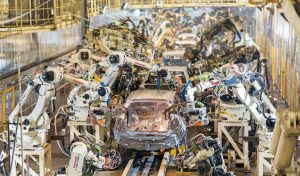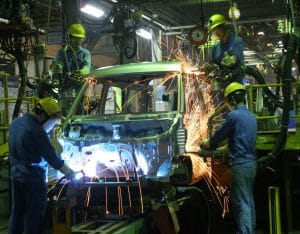
A new report from Fitch Group suggest automakers will find ways to become less reliant on China for auto parts.
A new report from the Fitch Group, the financial analysis and debt-rating service, says that manufacturers are moving away from China as a source for critical components but the size and scope the Chinese sales market exerts is an almost irresistible allure to car makers.
“We expect automakers to reduce their reliance on China as a manufacturing hub and diversify supply chains post COVID-19,” Fitch said in a report published this week.
“Notably, we expect manufacturers to reduce, not eliminate, their dependence on Chinese manufacturing of both vehicles and their components, owing to political pressure following China’s perceived opacity around COVID-19, and more importantly the evident supply chain risks associated with over reliance on one country.”
(China car market rebounds from coronavirus crisis.)
Fitch’s report noted no changes to equate to a substantial increase in investment in regions such as the Sub-Saharan African autos industry in the near term are expected.

Despite the fact that automakers are looking to pull component production out of China, but selling vehicles there is too alluring to pass up.
Moreover, China’s automotive market remains very attractive with strong pull factors for automakers including the quality and breadth of its transport network as well as its large driving age and spending population.
“We therefore expect any reallocation of resources to be cautiously partial in the near term,” Fitch said.
Furthermore, any countries hoping to lure automakers would be expected to offer investment incentives and more importantly meet certain macroeconomic, political and operational criteria, similar to those offered in the world’s largest automotive market.
(China trims back recently extended NEV subsidies.)
“China scores the top mark globally of 100 each on the rewards side for its vehicle sales volume (based on our five-year average forecast) and driving-age population indicators. This reflects the sheer size of the market and the large, underlying potential consumer base on offer for automakers,” the report noted.
In addition, China also gets high scores for its competitive landscape outperforming both the regional and global averages for these indicators. These scores indicate low barriers to entering and competing in the market, transport infrastructure that is able to cater for vehicle importers and distributors, and strong household spending power.

Nissan is one of the many automakers focusing on its efforts to sell more vehicles in China while allowing smaller markets to go by the wayside.
China also scored of 88.7 out of 100 for its new sales as a percentage of the fleet, which suggests a high level of vehicle replacement. This bodes well for new sales operations, but the country underperforms regionally on its regulatory environment indicator, receiving a score of 32.3 out of 100, compared with the Asian average of 47.8, which reflects the uncertainty in China regarding its willingness to offer a level playing field in comparison with domestic companies for entrants looking to enter the local autos market.
China’s also score of 7.3 out of a possible 100 on its vehicle sales growth indicator (which is based on our five-year average forecast) lags behind the Asia regional average of 42, indicating limited growth opportunities for automakers when compared to other markets in the region such Vietnam, Thailand and Indonesia.
(GM’s April sales in China rebound, rising 13.6 percent.)
However, even in the economic environment created by the COVID-19 pandemic, China scores well above the 80 point mark for its short- and long-term economic risk indicators, as well as 82.3 for its short-term political risk indicator, which makes for a sound operating backdrop for automakers to set up retailing activities, Fitch noted in a separate report issued in early May.

Lmfao. There is a typo in the title. This is a horseshit puff piece that is deranged and delusional. China is fucked big time and they know it